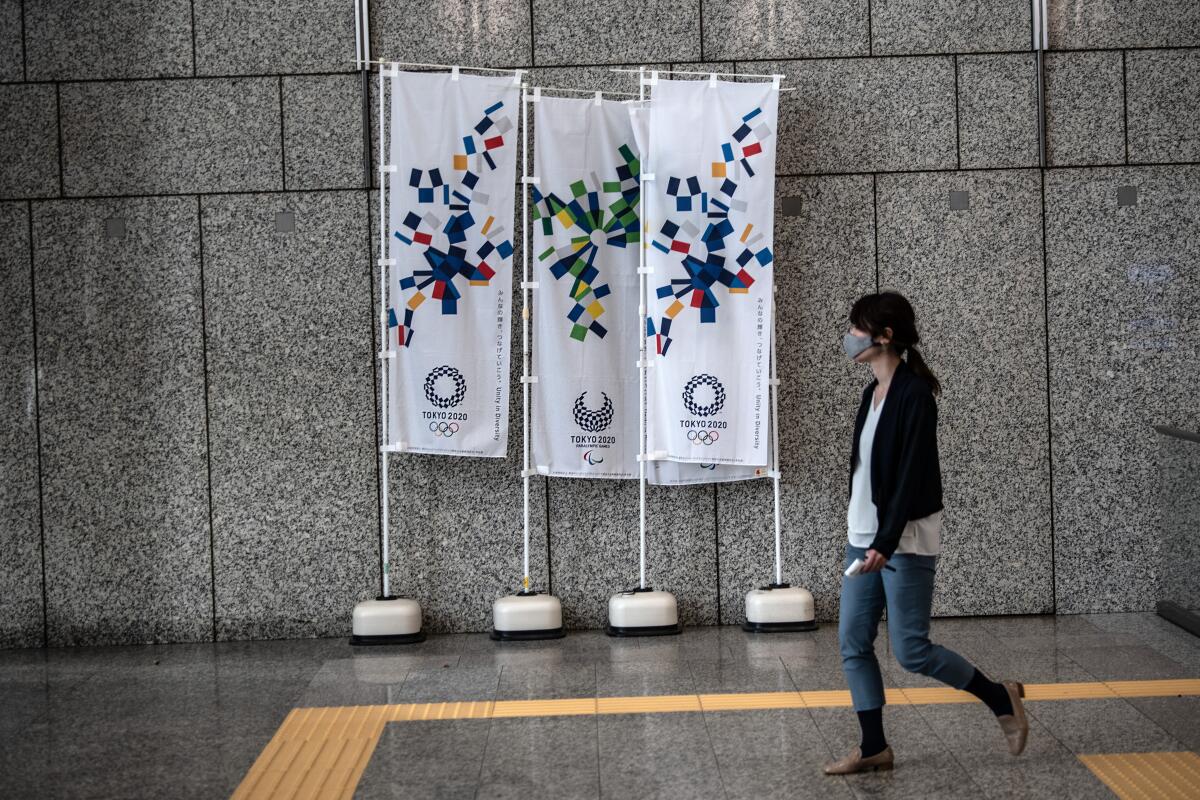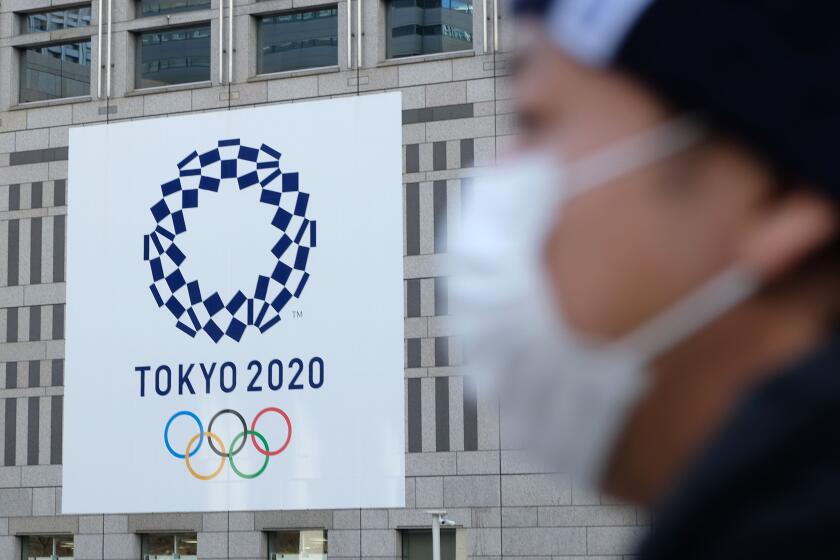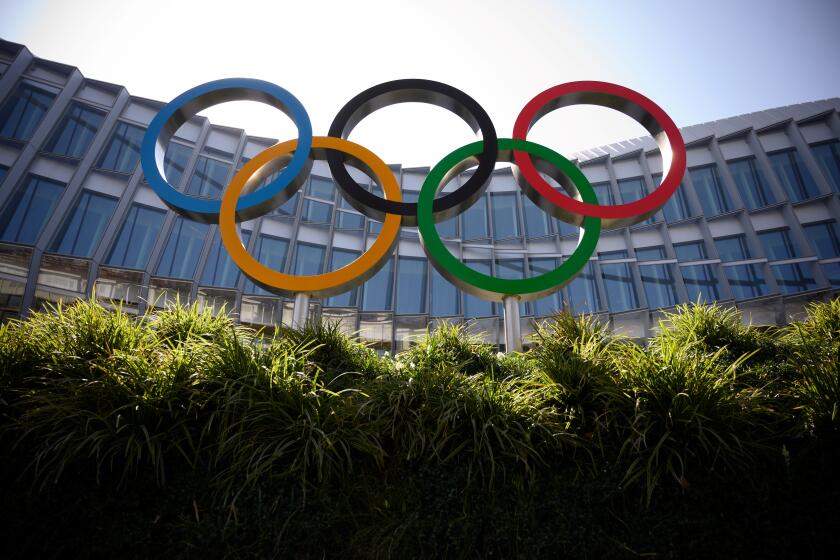Column: Postpone the 2020 Olympic Games, for the sake of everyone involved

- Share via
Through this global crisis, while the novel coronavirus continues to change the way millions of people think and behave, the International Olympic Committee has remained unshakably constant to its twisted version of noble principles.
The inspirational Olympic motto “Faster, Higher, Stronger” has a different meaning to those who sit in lush ivory tower isolation by arrogant choice and not by medical directive.
Faster means how rapidly they can rake in revenues from the Games. Higher means they’ve placed themselves so far above the athletes whose achievements they showcase that they are oblivious to the reality that lives and training schedules have been turned upside down by the COVID-19 outbreak. Stronger refers to their stubborn and self-centered plan, as stated Sunday by IOC President Thomas Bach, to take as long as four weeks before deciding whether to proceed with the Tokyo Summer Games on their scheduled dates of July 24 through Aug. 9.
There’s no need to wait. The plug must be pulled on these Games, and the sooner the better.
Canada knows it: Its Olympic and Paralympic committees said Sunday that they will not send delegations to Tokyo if the IOC decrees that the Games will be staged on the current dates. Team Canada’s new motto is “postpone today, conquer tomorrow.”
As the IOC launched into talks that could lead to delaying the 2020 Games, there was disagreement over whether a decision had already been reached.
“This is not solely about athlete health — it is about public health,” the committees said in a joint statement. “With COVID-19 and the associated risks, it is not safe for our athletes, and the health and safety of their families and the broader Canadian community for athletes to continue training towards these Games. In fact, it runs counter to the public health advice which we urge all Canadians to follow.”
Australia knows it: The Aussies have told their athletes to prepare for the Olympics to be held next year. “It’s clear the Games can’t be held in July,” Ian Chesterman, Australia’s chef de mission, said Monday. “Our athletes have been magnificent in their positive attitude to training and preparing, but the stress and uncertainty has been extremely challenging for them.”
USA Gymnastics, USA Track and Field, USA Swimming, the World Athletics federation, and the Olympic committees of Norway, Brazil, Slovenia and Germany all know it: Given the current state of the pandemic, putting athletes, coaches, fans, volunteers and officials together in close quarters would pose a risk no one needs to take. USA Gymnastics said Monday that responses from its athletes showed 62% were in favor of delaying the Games, and “we are adding our voice to the chorus advocating for postponement.”
The U.S. Olympic and Paralympic Committee also edged toward backing a delay of the Tokyo Games. To support its point, it cited its survey of 1,780 athletes, 25% of whom can’t train at all because of restrictions on gatherings and on travel. “It’s more clear than ever that the path toward postponement is the most promising, and we encourage the IOC to take all needed steps to ensure the Games can be conducted under safe and fair conditions for all competitors,” USOPC chair Susanne Lyons and chief executive officer Sarah Hirshland said in a joint statement.
The sooner postponement is announced, the sooner athletes can recalibrate their training and their dreams. The sooner postponement is announced, the sooner there’s a target for renewed hope, something to focus on and joyfully anticipate.
Canada’s Olympic committee announced Sunday it will only send athletes to the Tokyo Olympics if the Games are postponed by one year because of the coronavirus.
The Olympics are about celebrating each athlete’s journey and coming together in friendship. Conducting the Games against a backdrop of fear would contradict the Olympic ideal. IOC members have forgotten that, if they ever knew.
Postponing the Olympics would create a tangle of complications. Could accommodations for athletes and fans be secured at the same time next year? Would the venues be available? Do individuals and teams that have already qualified keep their Olympic spots, or would a new qualifying process begin? What about the TV networks and sponsors that largely fund the Games and hold IOC members at the end of a golden string? Can the whole program simply carry over a year, or would reductions in size or the number of events be necessary?
Those are real concerns, with no quick answers. But they’re all secondary to safeguarding the health and safety of everyone who competes in or watches the Games.
Postponing the Games soon would provide more time to negotiate with international sports federations and to come up with rules about qualifying for the 2021 Games. Postponing the Games soon would provide more time to work out the details with the TV networks and hotel associations.
Answers won’t be perfect. Athletes training to reach their peak performance this year might not be able to hit that peak again. Some might get injured between this summer and the summer of 2021. Others might not want to delay their post-competitive lives for another year. There should be a way the IOC can recognize them now, and again at the 2021 Games.
As much as we’d like to be wowed by Simone Biles tumbling and soaring her way to more gold medals on the gymnastics floor, as much as it would be fun to see swimmer Katie Ledecky add to her medal haul, it can’t happen this summer.
Every day the IOC waits before officially announcing a postponement is another day of stress and uncertainty no one should have to endure. Thomas Bach, do your duty. Postpone the Games now.
More to Read
Go beyond the scoreboard
Get the latest on L.A.'s teams in the daily Sports Report newsletter.
You may occasionally receive promotional content from the Los Angeles Times.









